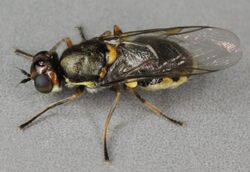Biology:Oxycera pygmaea
From HandWiki
Short description: Species of fly
| Oxycera pygmaea | |
|---|---|

| |
| Oxycera pygmaea North Wales | |
| Scientific classification | |
| Domain: | Eukaryota |
| Kingdom: | Animalia |
| Phylum: | Arthropoda |
| Class: | Insecta |
| Order: | Diptera |
| Family: | Stratiomyidae |
| Subfamily: | Stratiomyinae |
| Tribe: | Oxycerini |
| Genus: | Oxycera |
| Species: | O. pygmaea
|
| Binomial name | |
| Oxycera pygmaea (Fallén, 1817)[1]
| |
| Synonyms | |
Oxycera pygmaea, the pygmy soldier, is a European species of soldier fly.[8][9][10]
Description
The body length is 3.0 to 4.0 mm (0.12 to 0.16 in). Mesonotum punctate, with decumbent grey hairs. Both male and female black with yellow humeri, yellow notopleural margin, and small yellow spots on postalar calli.[11][6][12] [13]
Biology
The habitat is wetland, calcareous seepages. The flight period is from June to July.
Distribution
Northern Europe Central Europe up to southern Sweden Central
References
- ↑ 1.0 1.1 Fallén, C.F. (1817). Stratiomydae Sveciae. Lundae [=Lund]: Berlingianis. pp. 14 pp.
- ↑ Curtis, J. (1833). British entomology. 10. London: Privately published. pp. 438–441.
- ↑ Verrall, G.H. (1888). A list of British Diptera. [ed.1]. London: Pratt & Co.. pp. 34.
- ↑ Brunetti, E. (1889). "List of the British Stratiomyidae, with analytical tables and notes [part"]. The Entomologist 22 (312): 130–134. https://www.biodiversitylibrary.org/page/11410684#page/156/mode/1up. Retrieved 21 March 2023.
- ↑ Verrall, G.H. (1901). A list of British Diptera (2nd ed.). Cambridge: University Press. pp. 48.
- ↑ 6.0 6.1 Verrall, G. H. (1909). Stratiomyidae and succeeding families of the Diptera Brachycera of Great Britain British flies. 5. London: Gurney and Jackson. pp. 780, 34 p., 407 fig. https://www.biodiversitylibrary.org/item/36929#page/7/mode/1up. Retrieved 19 October 2022.
- ↑ Kertész, K. (1923). "A new Hermione from Hungary. (Dipt.)". Folia Entomologica Hungarica 1 (1): 9–11.
- ↑ Stubbs, Alan E; Drake, Martin (2014). British Soldierflies and their allies (an illustrated guide to their identification and ecology) (2 ed.). Reading: British Entomological and Natural History Society. pp. 528 pp, 20 plates. ISBN 9781899935079.
- ↑ Woodley, N.E. (2001). "A World Catalog of the Stratiomyidae (Diptera)". Myia 11: 1–462. https://www.researchgate.net/publication/303225468. Retrieved 7 December 2022.
- ↑ Zeegers, T.; Schulten, A. (2022). Families of Flies with Three Pulvilli: Field Guide Northwest Europe. Graveland: Jeugdbondsuitgeverij. pp. 256pp. ISBN 9789051070682.
- ↑ Seguy. E. Faune de France Faune n° 13 1926. Diptères Brachycères.308 p., 685 fig.
- ↑ E. P. Narchuk in Bei-Bienko, G. Ya, 1988 Keys to the insects of the European Part of the USSR Volume 5 (Diptera) Part 2 English edition. Keys to Palaearctic species but now needs revision.
- ↑ William Lundbeck Diptera Danica. Genera and species of flies Hitherto found in Denmark. Copenhagen & London,
1902-1927. 7 vols
 This article incorporates text from this source, which is in the public domain.
This article incorporates text from this source, which is in the public domain.
External links
Wikidata ☰ Q7115882 entry
 |

